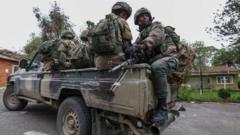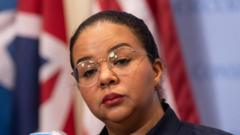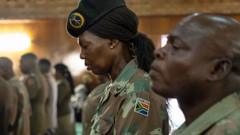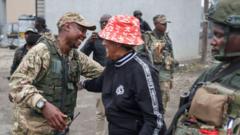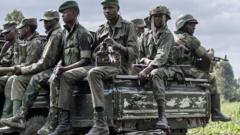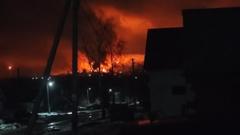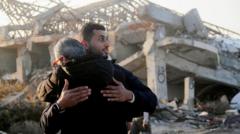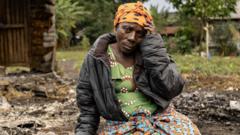As rebel forces draw closer to Goma, a city in eastern Democratic Republic of Congo (DRC), a humanitarian crisis is unfolding as tens of thousands flee their homes in search of safety.
Tensions Escalate as Thousands Disperse from Goma Amid Rebel Threat
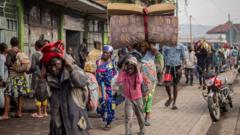
Tensions Escalate as Thousands Disperse from Goma Amid Rebel Threat
Amid rising conflict, Goma faces turmoil as rebel forces advance, displacing thousands.
In the past few days, explosions and gunfire have been reported in Goma, which has a population exceeding one million. According to a spokesman for the M23 rebel group, they anticipate taking control of the city by early morning local time. This announcement follows serious accusations from DRC's foreign minister, who claims that Rwanda is attempting to assert military dominance by providing support to the M23 rebels. Rwanda, for its part, claims to maintain a posture of defense rather than aggression.
Since the onset of their campaign in 2021, the M23 rebels have gained control over extensive regions of the eastern DRC, which is rich in minerals. With the insurgency intensifying, the group has made significant territorial gains, threatening Goma itself. Humanitarian organizations report that over 400,000 individuals have been displaced from the provinces of North and South Kivu since the beginning of 2025, exacerbating the ongoing crisis. Alice Feza, a displaced resident, shared her plight, detailing how she has repeatedly fled from various towns only to find herself once more in danger, with limited choices ahead.
International outrage has surged, with UN Secretary-General António Guterres calling for Rwanda to retract its forces from DRC and urging the M23 to halt their advance. Guterres expressed deep concern over the recent violence, which resulted in the deaths of 13 peacekeeping soldiers during clashes with the M23. The UK government has also advocated for an immediate cessation of hostilities against peacekeepers, while France echoed calls for Rwanda to withdraw its military presence.
Rwanda has faced accusations of supporting the M23, a situation the country's UN representative decried, suggesting that the focus should be on the alleged violations by the Congolese army that have sparked the ongoing conflict. In light of escalating violence, the UN has announced the withdrawal of non-essential staff from Goma, while essential operations continue in the region.
As the situation remains precarious, both local communities and international observers are bracing for what may come next in this rapidly evolving crisis.
Since the onset of their campaign in 2021, the M23 rebels have gained control over extensive regions of the eastern DRC, which is rich in minerals. With the insurgency intensifying, the group has made significant territorial gains, threatening Goma itself. Humanitarian organizations report that over 400,000 individuals have been displaced from the provinces of North and South Kivu since the beginning of 2025, exacerbating the ongoing crisis. Alice Feza, a displaced resident, shared her plight, detailing how she has repeatedly fled from various towns only to find herself once more in danger, with limited choices ahead.
International outrage has surged, with UN Secretary-General António Guterres calling for Rwanda to retract its forces from DRC and urging the M23 to halt their advance. Guterres expressed deep concern over the recent violence, which resulted in the deaths of 13 peacekeeping soldiers during clashes with the M23. The UK government has also advocated for an immediate cessation of hostilities against peacekeepers, while France echoed calls for Rwanda to withdraw its military presence.
Rwanda has faced accusations of supporting the M23, a situation the country's UN representative decried, suggesting that the focus should be on the alleged violations by the Congolese army that have sparked the ongoing conflict. In light of escalating violence, the UN has announced the withdrawal of non-essential staff from Goma, while essential operations continue in the region.
As the situation remains precarious, both local communities and international observers are bracing for what may come next in this rapidly evolving crisis.



